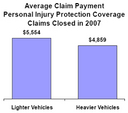IRC Research Documents Higher Injury Claim Costs With Lighter Weight Vehicles Implications of Rising Gas Prices Considered
 |
MALVERN, Pa. August 29, 2008; The cost of auto injury claims involving lighter-weight vehicles tends to be higher than the cost of claims involving heavy vehicles, according to new research from the Insurance Research Council (IRC). These findings may have important implications for those seeking to understand how higher gas prices will affect auto insurance costs.
IRC found that the average auto injury claim payment in accidents involving lighter-weight vehicles was 14.3 percent greater than the average payment in accidents involving heavy vehicles. These findings suggest that, as rapidly rising gas prices prompt more drivers to choose lighter and more fuel-efficient vehicles, the average cost of injury claims arising from motor vehicle accidents can be expected to climb.
"The impact of higher gas prices on drivers, accident severity, and insurance costs is anything but simple," said Elizabeth A. Sprinkel, senior vice president of the IRC. "Our findings indicate that higher average claim costs associated with lighter vehicles have the potential to offset, to some extent, whatever beneficial effects might occur from less driving. It's far too early to know how all these effects together will influence insurance claim costs."
To investigate the potential impact of rising gas prices on insurance claim costs, IRC analyzed 9,140 personal injury protection (PIP) claims closed with payment in 2007. Data for these claims were collected as part of the IRC's most recent auto injury closed claim study, summarized in the report, Auto Injury Insurance Claims: Countrywide Patterns in Treatment, Cost, and Compensation, 2008 Edition. IRC compared average total claim payments for the lightest 25 percent of the vehicles involved in accidents resulting in PIP claims with average total claim payments for the heaviest 25 percent of vehicles. Only claims involving automobiles, minivans, and sport utility vehicles were examined. Claims involving fatalities or permanent total disabilities were excluded to eliminate the distorting effects of these few claims on average cost calculations.
 |
IRC found additional evidence confirming the greater seriousness of injuries involving lighter-weight vehicles. Among claimants in heavier vehicles, 46 percent lost no time from work following their accidents. In contrast, only 38 percent of claimants in the lighter-weight vehicles lost no time from work. Claimants injured in lighter-weight vehicles were also 12 percent more likely to be hospitalized following their injury than were claimants in heavier vehicles.
Rapidly rising gas prices are expected to have numerous consequences for consumers and businesses. One widely-observed consequence is a reduction in the amount of driving, as drivers eliminate unnecessary trips and use more public transportation. Whether less driving will result in fewer accidents, and, in turn, lower automobile insurance costs, is unclear. What is clear, however, is that a reduction in the amount of driving is not the only consequence of higher gas prices that could affect automobile insurance costs. These IRC research findings suggest higher average claim costs as another potential consequence of rising gas prices.
For more detailed information on this research by the IRC, contact David Corum at (610) 644-2212, ext. 7506, or by e-mail at corum@cpcuiia.org. Or visit IRC's Web site, at www.ircweb.org.


